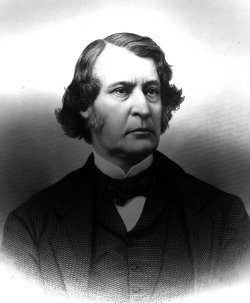Senator Charles Sumner
Charles Sumner was born in Boston in January of 1811, and graduated from Harvard in 1830. He edited a law review, served as a reporter for U.S. Circuit Court, and lectured on constitutional law at Harvard for three terms.
In 1837, he traveled through Europe, and lived a year in England before returning to Boston in 1840, where he worked six years on a 20-volume annotated edition of Veseyís Reports.
 He entered politics as a Whig in 1845, at a time when hostilities were growing between the United States and Mexico, arguing against the use of war as a means of settling international disputes, calling for arbitration in its place. He opposed the annexation of Texas, and spoke against slavery. He entered politics as a Whig in 1845, at a time when hostilities were growing between the United States and Mexico, arguing against the use of war as a means of settling international disputes, calling for arbitration in its place. He opposed the annexation of Texas, and spoke against slavery.
In 1848, he abandoned the Whig Party to support Martin Van Burenís unsuccessful bid for the Presidency as a candidate of the Free Soil Party.
In 1851, a coalition of the Democratic and Free Soil parties chose Sumner to fill the vacated U.S. Senate seat of Daniel Webster, who had resigned to become Secretary of State.
Sumner became a leader of the anti-slavery forces in the Senate. During the debates on slavery in Kansas, he delivered at two-day oration, entitled The Crime Against Kansas, that strongly condemned the institution of slavery in the South.
Emotions were so strong that Congressman Preston Brooks, of South Carolina, beat Sumner with his cane as Sumner was seated at his desk on the Senate floor. The caning of Senator Sumner became a symbol for the North of Southern brutality, while Brooks became a hero in the South and was easily reelected by his constituency.
At the outbreak of the American Civil War, Sumner argued for the emancipation of the slaves, and introduced the 13th Amendment to the Senate in 1864. He also nominated a black attorney to practice before the U.S. Supreme Court, was instrumental in creating the Freedmenís Bureau, and proposed a civil service reform bill in 1864.
Following the War, during Reconstruction, Sumner was instrumental in the passage of the bill that became, after his death, the Civil Rights Act of 1875, which outlawed racial discrimination in public places until it was overturned by the Supreme Court in 1883.
He was an ardent critic of President Johnsonís policies, and became an early proponent of his impeachment. When the Senate acquitted Johnson, Sumner proposed impeaching him again.
Senator Sumner sat on the Senate Foreign Relations Committee, where he backed U.S. claims against Britain for providing the Confederacy with ships during the American Civil War.
His opposition to President Grantís plans to annex Santa Domingo led to his removal as Chair of the Senate Foreign Relations Committee in 1870, prompting him to leave the Republican Party to support the coalition Liberal Republican-Democratic nominee for President, Horace Greeley, in 1872. That same year, he was nominated for Governor of Massachusetts by the same coalition, but declined for health reasons. He died two years later.
|

